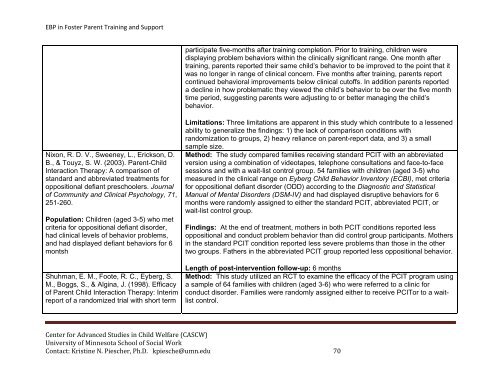Evidence-Based Practice in Foster Parent Training and Support ...
Evidence-Based Practice in Foster Parent Training and Support ...
Evidence-Based Practice in Foster Parent Training and Support ...
You also want an ePaper? Increase the reach of your titles
YUMPU automatically turns print PDFs into web optimized ePapers that Google loves.
EBP <strong>in</strong> <strong>Foster</strong> <strong>Parent</strong> Tra<strong>in</strong><strong>in</strong>g <strong>and</strong> <strong>Support</strong>participate five-months after tra<strong>in</strong><strong>in</strong>g completion. Prior to tra<strong>in</strong><strong>in</strong>g, children weredisplay<strong>in</strong>g problem behaviors with<strong>in</strong> the cl<strong>in</strong>ically significant range. One month aftertra<strong>in</strong><strong>in</strong>g, parents reported their same child’s behavior to be improved to the po<strong>in</strong>t that itwas no longer <strong>in</strong> range of cl<strong>in</strong>ical concern. Five months after tra<strong>in</strong><strong>in</strong>g, parents reportcont<strong>in</strong>ued behavioral improvements below cl<strong>in</strong>ical cutoffs. In addition parents reporteda decl<strong>in</strong>e <strong>in</strong> how problematic they viewed the child’s behavior to be over the five monthtime period, suggest<strong>in</strong>g parents were adjust<strong>in</strong>g to or better manag<strong>in</strong>g the child’sbehavior.Nixon, R. D. V., Sweeney, L., Erickson, D.B., & Touyz, S. W. (2003). <strong>Parent</strong>-ChildInteraction Therapy: A comparison ofst<strong>and</strong>ard <strong>and</strong> abbreviated treatments foroppositional defiant preschoolers. Journalof Community <strong>and</strong> Cl<strong>in</strong>ical Psychology, 71,251-260.Population: Children (aged 3-5) who metcriteria for oppositional defiant disorder,had cl<strong>in</strong>ical levels of behavior problems,<strong>and</strong> had displayed defiant behaviors for 6montshShuhman, E. M., Foote, R. C., Eyberg, S.M., Boggs, S., & Alg<strong>in</strong>a, J. (1998). Efficacyof <strong>Parent</strong> Child Interaction Therapy: Interimreport of a r<strong>and</strong>omized trial with short termLimitations: Three limitations are apparent <strong>in</strong> this study which contribute to a lessenedability to generalize the f<strong>in</strong>d<strong>in</strong>gs: 1) the lack of comparison conditions withr<strong>and</strong>omization to groups, 2) heavy reliance on parent-report data, <strong>and</strong> 3) a smallsample size.Method: The study compared families receiv<strong>in</strong>g st<strong>and</strong>ard PCIT with an abbreviatedversion us<strong>in</strong>g a comb<strong>in</strong>ation of videotapes, telephone consultations <strong>and</strong> face-to-facesessions <strong>and</strong> with a wait-list control group. 54 families with children (aged 3-5) whomeasured <strong>in</strong> the cl<strong>in</strong>ical range on Eyberg Child Behavior Inventory (ECBI), met criteriafor oppositional defiant disorder (ODD) accord<strong>in</strong>g to the Diagnostic <strong>and</strong> StatisticalManual of Mental Disorders (DSM-IV) <strong>and</strong> had displayed disruptive behaviors for 6months were r<strong>and</strong>omly assigned to either the st<strong>and</strong>ard PCIT, abbreviated PCIT, orwait-list control group.F<strong>in</strong>d<strong>in</strong>gs: At the end of treatment, mothers <strong>in</strong> both PCIT conditions reported lessoppositional <strong>and</strong> conduct problem behavior than did control group participants. Mothers<strong>in</strong> the st<strong>and</strong>ard PCIT condition reported less severe problems than those <strong>in</strong> the othertwo groups. Fathers <strong>in</strong> the abbreviated PCIT group reported less oppositional behavior.Length of post-<strong>in</strong>tervention follow-up: 6 monthsMethod: This study utilized an RCT to exam<strong>in</strong>e the efficacy of the PCIT program us<strong>in</strong>ga sample of 64 families with children (aged 3-6) who were referred to a cl<strong>in</strong>ic forconduct disorder. Families were r<strong>and</strong>omly assigned either to receive PCITor to a waitlistcontrol.Center for Advanced Studies <strong>in</strong> Child Welfare (CASCW)University of M<strong>in</strong>nesota School of Social WorkContact: Krist<strong>in</strong>e N. Piescher, Ph.D. kpiesche@umn.edu 70
















